How political parties have treated women leaders
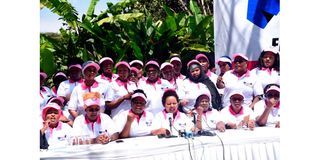
Kirinyaga Governor Anne Waiguru (seated centre) with other female politicians from different political parties speak to journalists at a Nairobi hotel in 2019.
What you need to know:
- The two-thirds gender rule is just one of the many troubles facing women as Kenya prepares for another election in August.
- At the centre of it is how political parties—and politicians in particular—treat women, with this bad treatment starting right at the nominations, the all-important precursor of the General Election.
- A study by the by IDEA says most parties will hand women hopefuls a ticket in areas where the outfits are unpopular.
President Uhuru Kenyatta’s inaction on former Chief Justice David Maraga’s September 2020 recommendation to dissolve Parliament for failure to enact gender parity laws is the latest bump in the long road to equality for Kenyan women in political leadership.
The Constitution requires Parliament to make laws to guarantee that no gender occupies more than two-thirds of elected and appointed positions.
And with the Building Bridges Initiative (BBI) facing a bleak future after being declared unconstitutional by the High Court and the Court of Appeal, hopes of achieving this constitutional rule, it seems, now lies with Kenyan voters at the ballot in the August 2022 General Election.
The BBI, the constitutional change drive backed by President Kenyatta and Orange Democratic Movement (ODM) leader Raila Odinga, had proposed a 50-50 Senate, with one man and one woman elected from each of the 47 counties, and the nomination of women to top up those required to meet the rule in the National Assembly.
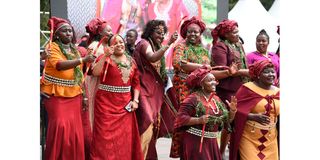
From left: Woman representatives Lillian Tomitom - West Pokot, Purity Ngirici - Kirinyaga, Gladys Shollei - Uasin Gishu , and other leaders at a meeting in Eldoret town in 2019. Female political aspirants face multiple challenges arising from Kenya’s deep-seated patriarchal norms.
In a huge score for gender parity activists, the BBI also wanted governor candidates to pick a person of the opposite gender as their running mate.
“There is no other likely way to resolve this matter. All previous attempts have failed. It is impossible to constitute a new parliament without the solution to the gender equation. This needs urgent attention and the solution of the BBI is the only viable one in our view. We need the highest court in the land to pronounce itself on this matter,” the BBI secretariat said in its pleadings to the Supreme Court, which will hear an appeal on the case in January.
But for women, the gender rule is just one of the many troubles facing them as Kenya prepares for another election in August.
At the centre of it is how political parties—and politicians in particular—treat women, with this bad treatment starting right at the nominations, the all-important precursor of the General Election.
For instance, of all the 12,119 aspirants who presented themselves for party primaries in the 2017 polls, only 1,333 (11 per cent) were women.
Party ticket
This statistic excludes those that ran for the woman representative position, which is exclusively held by women.
Of the 1,333, some 73 per cent vied for county assembly seats in the nominations.
A study by the International Institute for Democracy and Electoral Assistance International (Idea) says even worse is that most parties will hand women hopefuls a ticket in areas where the outfits are unpopular, and shun them where the party ticket is often as good as half the votes required in an election.
“Unless women are nominated in winnable areas, gender equality in Kenyan elections is unlikely to improve. Kenyan parties will continue to rely on the access of aspirants and candidates to resources for the foreseeable future. Even so, parties should aim to nominate women in secure areas even if they have more limited funding, perhaps encouraging wealthy male aspirants to run in more marginal areas where their resources would make more of a difference,” the Idea study recommended.
In another depressing statistic, only a paltry six parties fielded more than 10 women as aspirants during their primaries, of the 77 registered parties in Kenya in 2017, highlighting the steep climb women have to endure in the nominations—even before they get the chance to be candidates.
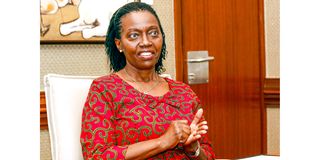
Narc Kenya party leader Martha Karua. She is eyeing the Kirinyaga County gubernatorial seat.
In ground-breaking research that revealed what it means for women to get to politics, Prof Karuti Kanyinga of the University of Nairobi and Maseno University’s Tom Mboya found that far fewer women make it to the ballot or win seats but they spend significantly more—a double tragedy.
In trying to win seats in the National Assembly, for instance, women spent an average of Sh23.6 million compared to men’s average of Sh17 million, the researchers said in their study findings, based on the 2017 polls.
“To put it simply, if you want to win a political position in Kenya, be rich and spend big. The more you spend, the greater your chances of winning—unless you are a woman,” the two researchers say.
In their conclusion, the researchers said the problems facing women in politics also stem from society’s culture, with candidates’ ability to solve local challenges seen to be determined by their proximity to the centre of power, which usually favours men.
“Female candidates face multiple challenges arising from Kenya’s deep-seated patriarchal norms. For example, it is seen as improper for women to lead large-scale rallies or campaign late into the evening. This means they must rely on costlier and labour-intensive strategies such as smaller events, door-to-door canvassing, and face-to-face meetings. Female candidates are also typically held to higher standards than men, while many voters simply believe women should not be in politics to begin with,” the two researchers said in their paper.
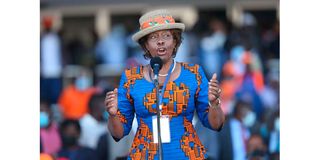
Kitui Governor Charity Ngilu speaks during the launch of Raila Odinga's 2022 presidential bid at Kasarani Stadium in Nairobi, in December last year. Ms Ngilu is also the party leader of Narc.
Even then, women have, however, celebrated the precedent-setting numbers of women that have expressed interest in the governor seat in the August polls, now at a staggering 25.
With Kirinyaga governor Anne Waiguru, Nairobi’s Anne Kananu and Charity Ngilu of Kitui all defending their seats in the August polls, analysts say the number of female heads in the 47 devolved units can only grow.
Other women eyeing governor seats are Martha Karua (Kirinyaga), Susan Kihika (Nakuru), Fatuma Achani (Kwale), Gladys Wanga (Homa Bay), Soipan Tuya (Narok), Florence Mutua (Busia) Sabina Chege (Murang’a), Cecily Mbarire (Embu), Wavinya Ndeti (Machakos), Ruth Odinga (Kisumu), and Aisha Jumwa (Kilifi).
Others are Peris Tobiko (Kajiado), Pamela Odhiambo (Migori), Sarah Serem (Uasin Gishu), Margaret Wanjiru (Nairobi), Agnes Kagure (Nairobi), Florence Mwangangi (Machakos), Faith Gitau (Nyandarua), Purity Ngirici (Kirinyaga) Dr Loice Kipkorir (Elgeyo Marakwet) and Patience Nyange (Taita Taveta).
Noting that much progress had been made, Ms Waiguru said political parties and Kenyans need to do a lot more to have more women in politics.
“As it is currently, a woman still has to put in much more effort than her male counterparts in convincing the electorate to elect her. Women are still judged by their gender more than the leadership or governance skills they possess or have demonstrated. This needs to change as society cannot leave behind more than half of its population and attain an equitable socio-economic and political development,” said Ms Waiguru.
Strong support
Ms Ngilu, the first woman to make a stab at the presidency in 1997 but came fifth after former presidents Daniel arap Moi, Mwai Kibaki, Mr Odinga and Vice-President Kijana Wamalwa, said things were changing for the better for women as time goes by.
“Balancing this thing is very difficult; that is why a lot of women find it very difficult getting into office. If they must succeed, they must have very strong support from their families and if they are married, from their husbands. My husband supported me, he was there every time. A woman needs all the support, from the spouse especially. Men are supported so much by their wives and I wish all women also have their husbands to support them,” Ms Ngilu told the Daily Nation in an extensive interview.
Ms Damaris Too, Chama Cha Mapatano-Kenya party leader, regrets that despite women constituting 60 per cent of the registered voters, they have been left out in leadership.
“We cannot sit back and watch, the economy and agriculture sectors have not been given much attention. The young people are educated but cannot get jobs and women are still struggling for economic independence. As a mother and youth, I have decided to do something about it,” Ms Too, who ditched Kanu to form her new party, explains.
There has also been strides in getting women into influential positions in parties, like Veronica Maina, the United Democratic Alliance (UDA) secretary general; Catherine Mumma, the ODM National Elections Board chairperson; and Harriet Chiggai, the Amani National Congress (ANC) Internal Disputes Resolution Committee chairperson.
But given Kenya’s registered political parties are over 70, this is a drop in the ocean.
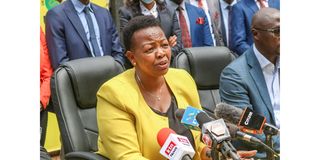
UDA Secretary-General Veronica Maina, addresses the media at UDA offices in Nairobi on December 20, 2021.
While all eyes are fixed on August, the 2017 election was an important step forward for women’s representation, and it saw more women win seats at all levels, except for the presidential race, which remains exclusively male.
For the first time, women became governors and senators (three of each in 2017, compared to none in 2013), while more women were elected to the national and county assemblies (23 members of single member constituencies in 2017 versus 16 in 2013, and 96 members of county assemblies in 2017 versus 82 in 2013).
“While these are positive changes, women constituted just 9.2 per cent of the 1,835 elected individuals in 2017, a marginal increase from 7.7 per cent in 2013,” concluded an analysis of the 2017 polls from a gender lens by the National Democratic Institute (NDI).
To guarantee even more women in the leadership posts, parties like Mr Odinga’s ODM say they are targeting the election of 15 female governors in the August polls, a huge feat were it to be achieved, but which will mean a huge turnaround by the party, especially at the nominations stage.
ODM Women’s League president Beth Syengo says they also seek to have 20 female senators and an equal number of MPs, besides at least five direct tickets to member of the county assembly (MCA) women aspirants, bringing the total possible candidates to 235.
While the women’s league is an idea all parties are encouraged to have—and often have semblances of them in their constitutions—only ODM and Kanu have a vibrant league, bringing together women to share ideas and forge forward.
Competitive areas
With the election beckoning, Idea says for political parties and other actors to promote the engagement of women in politics, they must train and strengthen their capacity to fundraise, support women who have expressed political ambitions even before they are nominated by their parties, consider a candidate-supported campaign fund to support women candidates, as well as help women become candidates in competitive areas.
Attempting to limit the extent to which the candidate-selection process is resource-driven is challenging for cash-strapped political parties but could yield positive results down the line, Idea added in a study.
For Kenyans, however, the ball is in your court, with many women—more than ever in Kenya’s history—planning to contest for different seats.





